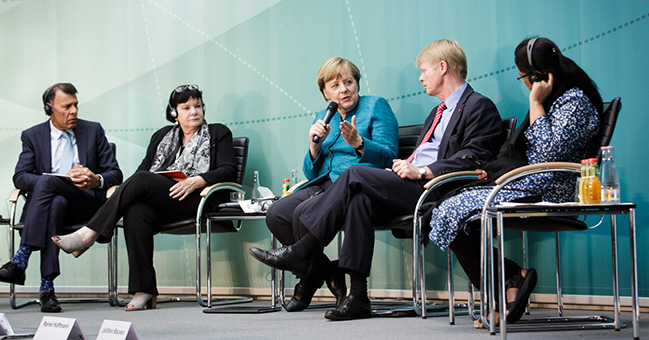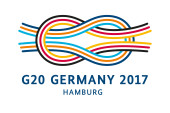Labour20 Dialogue Forum
Distributing prosperity fairly around the globe
The Labour 20 group of trade union representatives want new rules for fair globalisation and work in the digital era. At the L20 Dialogue Forum international trade unionists handed over their recommendations for the G20 Summit to Chancellor Merkel. "In a networked world we need to stick close together," Merkel said.
 Labour 20 represent the interests of workers at G20 level
Photo: Bundesregierung/Steins
Labour 20 represent the interests of workers at G20 level
Photo: Bundesregierung/Steins
Civil society organisations, including trade unions, are involved in preparations for the G20 Summit. "That means billions of workers actually have a seat at the G20 table," Chancellor Angela Merkel emphasised at the Labour20 Dialogue Forum in Berlin.
The Labour20 Summit is part of Chancellor Angela Merkel's G20 Dialogue Forum with civil society representatives. It has adopted as its motto Germany's three priorities for the G20 Presidency in 2017: "Ensuring stability, improving viability for the future and accepting responsibility". The goal is to draw up new rules for fair globalisation and work in the digital era.
At their meeting the L20 formulated joint positions and demands for the G20 Summit in Hamburg on 7 and 8 July.
Cooperating in a networked world
The Chancellor underlined how important it was that the L20 drafted common demands, even though living conditions and political systems varied greatly across the countries involved.
The Labour 20 Group focuses on the issue of work, in particular working conditions and employment opportunities. Workers need to earn enough to feed a family. Another important topic is whether digitalisation will make human work superfluous.
That is why the G20 have always been committed to steady and sustainable economic growth. "What happens in one country affects us all. In a networked world we need to stick close together," Merkel said.
Labour20: Growth and jobs
Shaping a fair global economy to ensure good work worldwide has been placed at the top of the L20 agenda.
Who are the L20?
The Labour 20 Group (L20) represents the interests of workers at the G20 level. It unites trade unions from the G20 countries and international trade union industry federations. The work of the L20 is organised by the G20 host country's trade union confederation, which this year is the German Trade Union Confederation (DGB).
Only open markets can create prosperity for all
"The focus must be on people, not on maximising profits in the financial markets," the Chancellor said. Increasing economic prosperity had to benefit economically weaker countries too, she added. The Group of 20 has set itself the goal of strong, balanced, sustainable and inclusive economic growth.
A common trade policy was hugely important, the Chancellor said. "Those who obstruct or even sever value added chains, those who isolate their economies and engage in protectionism harm all those involved." Trade barriers made it particularly difficult for small and medium-sized enterprises – especially those in industrialising nations and emerging economies – to gain a foothold on global markets. But a fair balance needed to be struck before trade barriers were eliminated, Merkel said, including in the interests of one's own workers, since unemployment was high in Europe too.
International trade agreements also needed to focus on workers' working conditions. Transparency was very important, the Chancellor said. There were many private initiatives that were engaged in the work of collective bargaining along supply chains. The Chancellor welcomed the fact that the parties to collective bargaining in Germany concluded very diverse collective agreements: for wages, training, qualifications and much more.
Sustainable supply chains
A total of 450 million jobs are linked to global value added and supply chains, Merkel said. That was why framework agreements had been drawn up on decent working conditions.
Sustainable global supply chains can help to further economic and social development around the world. It is up to international companies, too, to ensure that labour, social and environmental standards are adhered to everywhere.
The Federal Government was instrumental in ensuring, at the G7 Summit in 2015, that the issue gained its rightful place as a priority topic on the global agenda. A "Vision Zero Fund" was set up during Germany's G7 Presidency. The money is to be used to guarantee better working conditions at all production sites and in all places of trade. Angela Merkel stated that the G20 would continue to work to protect workers' rights.
Shaping the future of work in the digital era
Just like the G20 ministers for labour affairs, the L20 are in the process of redefining labour and social standards for work in the digital era. Digitalisation creates opportunities for good work. But new rules – for example on social security or education and training – are needed to ensure good employment conditions going forward.
It was important, Merkel said, to develop women's digital literacy and improve their access to education: "We want to close the employment gap between women and men." The fact that the issue had been discussed at all three dialogue forums was a good sign, the Chancellor added.
Who took part in the L20 Summit?
Reiner Hoffmann, Chair of the DGB, welcomed leaders of international trade union federations and high-ranking representatives of international organisations, including
- Guy Ryder, Director-General of the International Labor Organization (ILO),
- Gabriela Ramos, G20 Sherpa for the Organisation for Economic Cooperation and Development (OECD),
- Sharan Burrow, General Secretary of the International Trade Union Confederation (ITUC),
- Frances O’Grady, General Secretary of the British Trades Union Congress (TUC),
- Jean-Claude Mailly, General Secretary of the French General Confederation of Labour - Workers' Force (CGT-FO) and
- Trade union leaders from the G20 countries.
Wednesday, 17 May 2017

